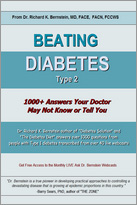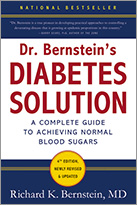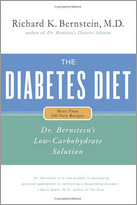I decided on a low-carbohydrate regimen. In the past I’d lost weight on low fat/low calorie diets, but I always packed it back on, and more with each cycle. Moreover, I prefer meat, fish, cheese, and eggs to brown rice and collard greens. And then, it seemed reasonable to me, carbohydrates being the chief contributor of glucose in the blood, the fewer carbohydrates in the diet, the better the chance of getting the blood sugar count down.
From the start I was puzzled that the American Diabetes Association diet was virtually identical to the American Heart Association’s, Stroke Association’s, and American Cancer Society’s diets. Were these organizations not faced with different problems calling for, it seemed obvious, different diets? In the hospital, when I was first diagnosed, I joked to the diabetes consultant, “Oh my, no more pizza!” “Oh sure, you can have pizza,” she said, “you just can’t have fatty meat toppings.” It didn’t add up. It seemed to me that in pizza, so far as blood sugar was concerned, the culprit was the crust. I was thinking along these lines, albeit with nothing but my inclinations to back me up, before I read Dr. Bernstein’s Diabetes Solution and Dr. Atkins’ New Diet Revolution.
I’m afraid I ignored the prohibitions of coffee and alcohol found in Atkins’s book. I continued to drink coffee in the morning and alcohol in the evening, usually in moderation. Powerful habits. I did, however, strictly observe Dr. Atkins’ weight loss prescription for a progression of carbohydrate counts, first 20 g. per day, then 30 g. daily, etc. Indeed, with Dr. Bernstein setting a maximum of 30 g. per day for diabetics, I remained at that level longer than Dr. Atkins requires.
In seven months, I discarded the 70 excess pounds at a pretty constant rate of 10 pounds per month. On my “maintenance diet,” I do not “count” carbohydrates. I abjure sugar (save for the bit in prepared foods like catsup); I eat no flour and bread (save for lightly dredging fish and chicken to be fried in flour), no pasta or pizza (I do miss pizza!), no rice, potatoes, root vegetables, fruits, no foods dense in carbohydrates. My guess is I consume between 30 g. and 60 g. of carbohydrates a day. In the eight months since reaching my target weight of 200 pounds, my weight has not fluctuated more than a few pounds. I use quite a few vitamin and mineral supplements, including chromium picolinate, and take 6-8 g. of psyllium fiber per day because of a tendency to constipation when I eat a great deal of cheese.
I cannot gauge the extent to which my low carbohydrate diet contributes to blood sugar control because I am on diabetes medications, including a sulfonylurea such as, for different reasons, Drs. Atkins and Bernstein disapprove (Amaryl, 2-4 mg. daily). I also take 2000 mg. of metformin daily. When I have reduced the Amaryl to 2 g. or none, my average blood sugar counts rise more than10 mg/dl. I am not happy with the fluctuations in the blood glucose numbers I get on my home tester, but my physician says that, with a damaged pancreas, I am being unrealistic. It occurs to me that if, as Dr. Bernstein advises, I limited my daily carbohydrates to 30 g. every day, I might be able to improve and stabilize these numbers, and possibly eliminate the Amaryl, which I would like to do. I have not, to date, been able to screw up the resolve required for so demanding a regimen. Maybe someday. My A1C is excellent: 12 when I was first diagnosed, it now ranges between 4.5 and 5.4.
I have seen other positive consequences of adopting a low carbohydrate diet. My blood pressure, cholesterol, etc. were never a concern. During the years of my obesity, my numbers were at the wrong end of the acceptable range, occasionally a few points high, but usually within guidelines. After 15 months on a high fat, low carbohydrate diet, all have improved to desirable levels: cholesterol is 185; HDL cholesterol 100; LDL cholesterol 78.2, VLDL 6.8; triglycerides 34; blood pressure 124/68. An acid reflux problem that required daily medication for ten years has disappeared.
I have several times reread Dr. Atkins’ New Diet Revolution and Dr. Bernstein’s Diabetes Solution. I have also read a good deal of material published by the “nutrition/dieting establishment” which is highly critical of Dr. Atkins; and also many publications of orthodox diabetologists for whom Dr. Bernstein and his successful therapy might as well not not exist; he is a pariah. Given my personal experience, and the anecdotal, gastroenterological and other scientific, and historical evidence marshalled by Drs. Bernstein and Atkins, it disturbs me that the “establishment” continues to preach that dietary fat is the villain in diabetes, obesity, coronary problems, etc., and that the healthy and therapeutic diet is one that is largely carbohydrates. Perhaps the hint of hysteria with which the high carbohydrates/low fats diets are pushed these days indicates that proponents of dietary orthodoxy now know they are wrong? In my personal experience, people who suspect they have been very wrong about something more often react with outraged indignation at the very suggestion of such a thing, rather than eat crow.
I am aware that the American Heart Association is, in small increments, increasing the amount of dietary fat it allows, and that the American Diabetes Association has conceded that, so far as blood sugar levels are concerned, one consumed carbohydrate, whether it comes from asparagus or refined sugar, acts pretty much like every other.
However, if Dr. Atkins is correct in the area of weight loss , and Dr. Bernstein is correct about the kind of diet that lowers blood sugar in diabetics, merely increasing the dietary fats allowance ten or twenty percent is not going to help anyone. And, surely, one might draw radically different conclusions from recent findings about the effects of carbohydrates in the diet than to tell people, that it’s okay to have the 37 g. of simple carbohydrates in a Pop Tart so long as the dieter reduces the roasted eggplant he planned to eat that day by six cups. (Good Lord!) The key to the success of the Atkins and Bernstein regimens, it seems to me (and I am reasoning, not writing as a scientist, which I am not) is not increasing fats consumption per se ; it is in slashing carbohydrates in the diet to a very small amount and paying no attention to the increase in fat consumption that necessarily follows. Dietary fat causes obesity and, therefore, for some, diabetes, it seems to me (deducing again, making no claims which I am not qualified to make), only when consumed along with large quantities of carbohydrates. The key, as Drs. Bernstein and Atkins say, is cutting carbohydrates to very low levels. I have been very lucky in that, whilst my personal physician did not endorse Atkins and Bernstein, he did not denounce them as, other diabetics have told me, their doctors have done. (At his request, I loaned him my copy of Dr. Bernstein’s Diabetes Solution.)
The insistence of orthodox dieticians, in the face of evidence to the contrary, on depicting dietary fat as an evil of diabolical degree, is intriguing. Its origins surely lie in the fact that, for two hundred years, food reformers have inclined toward vegetarianism and, if in diluted form, their preachments have infiltrated medical and nutritional orthodoxy. Add to that the propensity of human beings to refuse to face evidence they are mistaken, and you have the semi-hysteria with which Dr. Atkins is assailed and Dr. Bernstein rendered virtually a non-person in a field in which he has had great success. The hope is that as the evidence mounts (as it is doing!) that the ever-increasing carbohydrate consumption of the last thirty years (and the steep decline in fats consumption) just maybe has something to do with the precisely contemporaneous “epidemic” in Type II diabetes and obesity, perhaps the two of them will get their due.
J.R.C.
Bandon, Oregon




